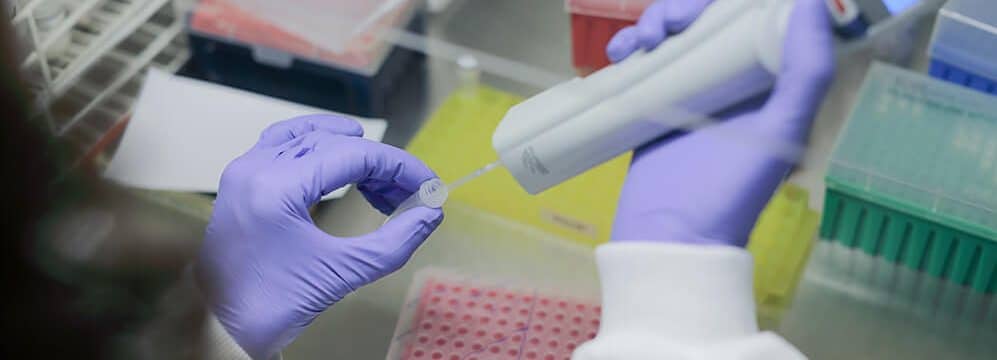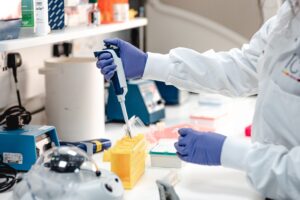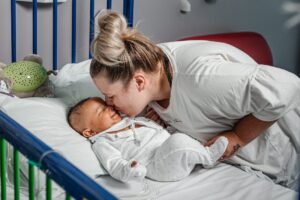All newborns with Down syndrome to get leukaemia test to reduce deaths
Press release 21 February 2018 Landmark new genetic testing has been developed to detect signs of a potentially fatal preleukaemic condition that can develop into full blown leukaemia in children with Down syndrome.

New clinical guidelines, published today in the British Journal of Haematology, are a result of years of research and clinical studies by researchers at the University of Oxford, funded by the charities Bloodwise and Children with Cancer UK.
It is expected that the guidelines will become the international gold standard of care for children with Down syndrome, changing the way that newborns at a high risk of leukaemia are treated.
Around one in 10 children with Down syndrome are born with a pre-leukaemic condition known as ‘Transient Leukaemia of Down syndrome’ (TL-DS). This condition, which is also sometimes called “TAM”, goes on to develop into Acute Myeloid Leukaemia of Down Syndrome (ML-DS) in one in five cases.
TL-DS itself carries significant risks, with up to one in five children with the severe form dying within six months of diagnosis as a result of the condition – most commonly from liver dysfunction. Mutations to the GATA1 gene, which is important to healthy blood production, are found in both TL-DS and ML-DS in children with Down syndrome.
The new clinical guidelines recommend that a full blood count, which measures levels of different types of blood cell in the blood, is taken within three days of birth in children with Down syndrome. All newborns with Down syndrome should also be examined for signs of TL-DS, which include organ enlargement, liver dysfunction and skin rashes.
If blood counts reveal that there are high levels of immature ‘blast’ cells in the bloodstream and there are physical symptoms, babies should be screened for the GATA1 mutation to determine if they have TL-DS – a test that was developed by the Oxford group.
The outcome for children with TL-DS who develop severe liver dysfunction and other complications is significantly improved by early intervention. The new guidelines recommend that all babies confirmed to have TL-DS are monitored regularly and children who develop life-threatening symptoms should be given low-dose chemotherapy immediately.
Professor Irene Roberts, at the University of Oxford, who led the research said: “Until now guidelines for the treatment of children with Down syndrome at risk of developing leukaemia have been vague, implementation has been haphazard and children have been diagnosed late as a result. Early intervention greatly increases children’s chances of survival if symptoms do develop, helping to save lives.”
The guidelines recommend that children with TL-DS who do not experience life-threatening symptoms should be monitored for a number of years to check for any signs of progression into leukaemia.
Professor Paresh Vyas, from the University of Oxford, said: “A simple test can ensure that those children at risk of cancer are put under the care of a specialist paediatrician. They are properly monitored and are treated straight away when symptoms develop. Importantly, it also provides reassurance to the parents of those children not at risk, removing the fear and worry of leukaemia for many families.”
Cliff O’Gorman, Chief Executive of Children with Cancer UK, said: “Children with Down syndrome are far more likely to develop acute myeloid leukaemia than those without – yet until now testing and monitoring for signs of the condition has been inconsistent.
“Early intervention is crucial and these new clinical guidelines will help ensure that children with Down syndrome who develop signs of myeloid leukaemia have the best possible chance of survival. It is vital that we continue to fund pioneering research to improve the quality of care for young cancer patients, and keep more families together.”
Dr Alasdair Rankin, Director of Research at Bloodwise, said: “Step-changes in care for people with blood cancer don’t always come from new drugs – new tests and guidance for how doctors deliver care can make a huge difference very quickly. This new diagnostic test, the new clinical guidelines and the excellent research that has delivered them will change the lives of children with Down syndrome and their families. Bloodwise will be keen to make sure that testing is available nationally for all newborns with Down syndrome and that the new guidance is followed in practice.”
ENDS
NOTES TO EDITORS
The guidelines are published online in the British Journal of Haematology under the title “Guidelines for the investigation and management of Transient Leukaemia of Down Syndrome”.
About Children with Cancer UK
Children with Cancer UK is the leading national children’s charity dedicated to research into cancer in children and young people. Inaugurated in 1988 by Diana, Princess of Wales, in memory of Jean and Paul O’Gorman our aim is to improve survival rates and quality of survival in young cancer patients and to help research ways of reducing cancer incidence.
Last year Children with Cancer UK invested £5.9m in new research across a full range of childhood cancers. We currently have more than 60 projects under way at leading centres around the UK. For more information visit www.childrenwithcancer.org.uk
About Bloodwise
Bloodwise is the UK’s specialist blood cancer research charity dedicated to improving the lives of people living with and beyond blood cancer. Over 40,000 people of all ages, from children to adults, are diagnosed with blood cancers and related disorders every year in the UK. It is a complex disease area made up of over 100 individual diseases. Some affect thousands of people, such as common forms of leukaemia, lymphoma and myeloma. Others affect only a handful. But together, blood cancers are the fifth most common form of cancer and the third largest cause of cancer death in the UK.
The charity’s research is targeted at understanding more about blood cancer, finding causes, improving diagnosis and treatments, and running ground-breaking clinical trials for patients. The charity champions patients’ needs by influencing relevant decision makers and influencers, and seeking to raise awareness of the issues faced by patients. Their patient services provide information, support and assistance to patients at every stage of their journey. For more information visit www.bloodwise.org.uk
Other stories
We have lots of information to help you learn more about childhood cancer. From specific cancer types, to treatments and causes.








